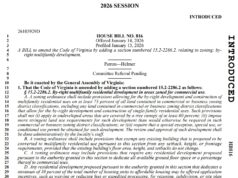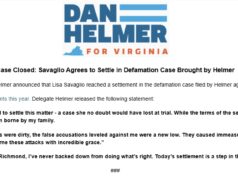First off, let me say that every single person in Virginia should spend one day in a criminal court and see what the criminal “justice” system looks like. If you come away dry-eyed, you’re stronger than me. I watched over fifty people be arraigned in rapid-fire succession. Not one single person was white. Many seemed to barely speak English, but did not receive a translator (some did), and few seemed to understand what was happening to them.
Today was the first day for cases to be heard under Fairfax’s new Commonwealth’s Attorney, Steve Descano. He campaigned on the promise of not prosecuting simple marijuana possession–something that has had mixed results in other Virginia jurisdictions (see Norfolk, and Portsmouth)–but that is consistent with Attorney General Mark Herring’s policy objectives.
As soon as Fairfax Judge Marc Simmons began, new Deputy Commonwealth’s Attorney, Terry Adams made a motion to nolle prosequi (dismiss) a case of simple marijuana possession (simple means a small amount, not suggesting an intent to distribute). He explained to the judge that, as the office had informed the Chief Justice on December 27th in a written letter, it would be the policy of Commonwealth’s Attorneys office not to prosecute such cases. He further explained that the Virginia Courts have declared the prosecutor to be the first and best judge of whether to prosecute a case, and that the court should not interfere with the Commonwealth’s Attorney doing that job as they see fit.
He went on to explain the numerous reasons that spending the resources of law enforcement (five members of law enforcement were in Court waiting for cases to come up where they were the arresting officer), the prosecutor’s office, the DFS labs, and the courts on such cases is not in the public’s interest. He pointed to the nearly 12,000 such prosecutions from 2017 through 2019; the backlog of 12,609 samples awaiting testing at the DFS lab; and finally, the fact that it has been found recently that lab tests cannot differentiate between marijuana and legal hemp, making these tests unreliable and the cases unlikely to result in convictions.
The judge called it a “nice speech,” but asked whether the Commonwealth’s Attorney planned to do this in all cases, and whether Adams had spoken to the police in this particular case. He then said he was denying the petition to nolle prosequi, because there was “nothing to do with this case, and here in this courtroom, everything is individualized.” Adams requested a dismissal with prejudice, which was also denied.
Adams then informed the judge that the Commonwealth’s Attorney would not present any witnesses at the hearing. When a case is being heard, the state is represented by the Commonwealth’s Attorney. With the judge refusing the motion to dismiss the case, the case proceeds to a trial; however, the Commonwealth’s Attorney does not have to present any evidence against the defendant or bring any witnesses. In that case, the judge–or jury in the case of a jury trial–would likely have to find that the state did not “prove its case against the defendant” and since defendants are innocent until proven guilty, the defendant would likely be found not guilty at this point.
A few minutes later, another case of marijuana possession came up. In this instance, the defendant had a defense attorney present to represent him. The Deputy Commonwealth’s Attorney again made a motion to dismiss. The judge said “I will assume you have spoken with the defendant’s attorney,” and then agreed to dismiss the case. Note that the defense attorney did not utter a word, presented no facts or evidence. The only difference between this case and the previous one is that a lawyer was present.
Here’s the thing, though. A defendant cannot get a court-appointed lawyer on a simple marijuana possession charge unless the prosecutor is seeking jail time. Even then, most defendants are not poor enough (earning less than $15,613 annually) to qualify for a court-appointed lawyer. So, anyone who can afford a warm body to stand next to them while the Commonwealth’s Attorneys’ office asks for the case to be dismissed, walks away with no charges.
Luckily, on this day, a couple of defense attorneys stepped up on the spot to “represent” the defendants. By represent, I literally mean, stand adjacent to the defendant while their cases were dismissed. One was Todd Zinicola, who offered to represent the clients pro bono (for free). Dawn Butorac, a member of the Fairfax Public Defender’s office, also did so. And as a result, 6 of the 7 simple marijuana possession cases (including the first one that the judge initially refused to dismiss) were dismissed, with one continued. This is exactly why the Commonwealth’s Attorney is an elected position–because the community spoke with its votes and demanded a prosecutor that wouldn’t waste valuable resources on a victimless criminal act that is legal in numerous other states, and that will probably be decriminalized if not legalized soon here as well.










![Sen. Tim Kaine: Tommy Tuberville “brands [Ghazala Hashmi] an ‘enemy.’ Because she’s an immigrant? A Muslim? A woman? A poet?”](https://bluevirginia.us/wp-content/uploads/2026/01/tubervillekaine-100x75.jpg)
